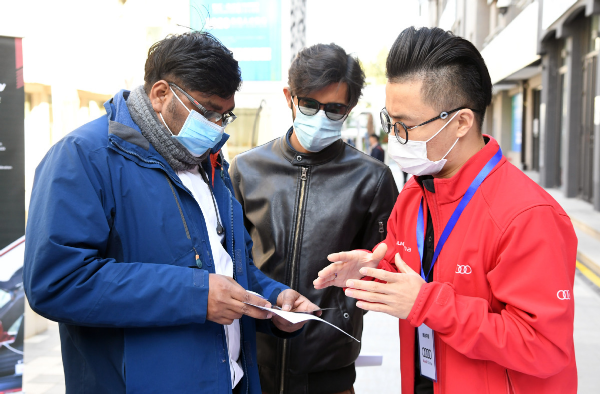Preferential policies draw talent from home and abroad

Beijing has recently implemented a number of preferential policies for domestic and foreign investors in the service industry and established a free trade zone.
As such, the capital is welcoming companies, partners and international institutions from all over the world to enjoy the benefits of its development.
"Beijing's further opening-up of the service sector and the establishment of the FTZ have brought crucial opportunities that will drive the city's high-quality development," said Liu Yinchun, deputy secretary-general of the municipal government.
"We welcome international organizations, multinational corporations and other enterprises to bring projects to Beijing for win-win cooperation and embrace a better future together."
In 2015, the State Council, China's Cabinet, approved plans for the national service industry to open a demonstration zone in Beijing.
The zone offers preferential policies for foreign investors in sectors such as science, culture, entertainment, finance, tourism and healthcare.
In September, the central government announced it had approved the Beijing FTZ.
By April 20, 147 of the 251 tasks approved by the State Council related to the two zones had been implemented, according to the city government.
Meanwhile, more than 1,400 new projects have started in the capital and are benefiting from the policies.
Up to 58.5 percent of the tasks, including preferential policies for investors, have been completed.
Many of the measures are being seen in the country for the first time, said Yan Ligang, director of the Beijing Bureau of Commerce.
"For example, tax reductions for certain qualified enterprises, simplified approval procedures for high-tech companies and a transfer platform for private equity investment are among the first such policies in China," he said.
In the future, Beijing will be more open to foreign capital and data transmission. It will also provide preferential tax policies to create a better business climate, Yan said.
"More companies will benefit from the development of the two zones," he added.
Benefits
In recent years, Beijing has rolled out a number of measures to further open its financial market, thereby attracting a large number of foreign-invested companies.
A growing number of well-known foreign financial institutions, including Visa, MasterCard and SWIFT, have opened branches in the city.
According to the Beijing Municipal Government, Finance Street in Xicheng district and the Lize Financial Business District in Fengtai district will be the major demonstration zones for the opening-up of the service sector.
Meanwhile, efforts will be stepped up to support innovation in the fintech industry.
The Beijing FTZ will cover 119.68 square kilometers and will include dedicated areas for science and technological innovation, international business services and high-end industries.
They will be located in the Zhongguancun area, the central business district and the Beijing Economic and Technological Development Area.
Zhongguancun, where a large number of colleges and much high-end talent are clustered, will focus on science and technological innovation.
In March, hundreds of representatives of international organizations and multinational corporations visited the area and had discussions with local officials.
They saw new technologies such as self-driving cars, as well as intelligent voice-control and digital payment technology, displayed in the area.
The companies also enjoy multiple preferential policies to help the promotion of rapid growth.
"The opening-up of the service sector has been conducted according to different industries, while policies for the FTZ are being carried out according to regions to create clusters of companies," said Wang Hao, Party chief of Beijing's Chaoyang district.
He said the combination of the two dimensions will provide many new opportunities.
The CBD in Chaoyang, one of the most international areas, is home to the headquarters of many foreign companies and it has played a crucial role in the FTZ's international commerce services.
The CBD's investment service center came into use on Jan 3, combining the functions of investment introduction and services related to government affairs.
So far, the center has helped 122 companies, including Canon, establish offices in the area.
To better serve overseas talent, the CBD has also set up a one-stop service center to help foreign nationals with documentation issues, including work permits, social insurance and cross-national marriages.
The center, which provides 120 services, opened on Oct 31.
Yu Enyuan, founder of Neolix, a startup that makes driverless delivery vans and is located in the Beijing Economic and Technological Development Area, said he was surprised that the policies could be implemented so quickly.
"It has encouraged us to accelerate our technological innovation," he said.
The area, in southern Beijing, focuses on high-end manufacturing. As such, it has encouraged many companies from home and abroad to establish factories.
The local government has also been providing a "butler service" for companies to raise efficiency.
Sun Guohua, president of integrated circuit producer U-Precision, said that despite the COVID-19 epidemic the company's new project has developed quickly. That's mainly thanks to the excellent services provided by the area.
Local authorities have organized full nucleic acid testing for employees and seven sessions of group vaccinations, which have ensured the project's progress.
Invest in China Copyright © 2026 China Daily All rights Reserved
京ICP备13028878号-6
 京公网安备 11010502032503号
京公网安备 11010502032503号





